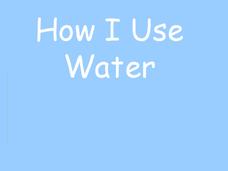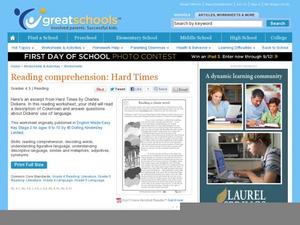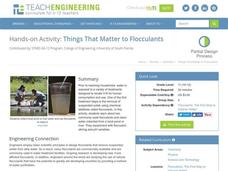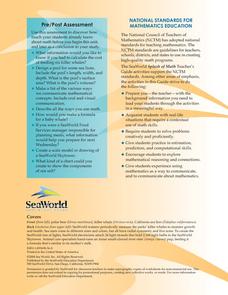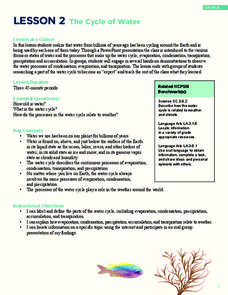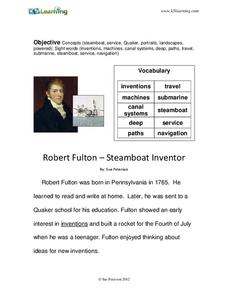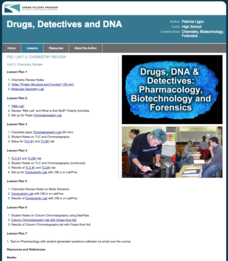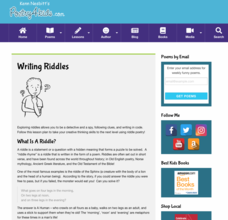Curated OER
T3 Lesson Plan: Number 3
Sixth graders investigate local water. In this water cycle lesson plan, 6th graders take samples from surrounding water sources. Students record data from the samples, compare and graph the results.
Curated OER
How I Use Water
Beginning with a brief anticipatory set on how water is commonly used, this presentation evolves into a well planned lesson on the water cycle. Students will discuss vocabulary, label the parts of the water cycle, locate where water is...
Curated OER
Winter Wonderland - Winter Olympics and the Water Cycle
After a concise introduction to the water cycle, junior meteorologists access NOAA's average snowfall data. They choose a city to examine in terms of precipitation. Then they look at historical snowfall data and use it to predict snow...
Curated OER
Reading Comprehension 5: Level 8
Why is an atlas called an atlas? Because it is named for the Greek Titan, Atlas, of course. Young readers learn all about Atlas and atlases in a short passage used as the basis of a reading comprehension exercise. After responding to...
Curated OER
Reading a Classic Novel
Charles Dickens offers an excellent example of sensory writing in this reading comprehension worksheet. Learners read excerpts from the novel Hard Times in which he describes the New England industrial city of Coketown. They...
Teach Engineering
Things That Matter to Flocculants
How does the dirt get out of your drinking water? A hands-on activity introduces the use of flocculants to help clear solid particles out of water. The plan walks learners through the process of setting up an experiment that...
Curated OER
Animal Farm Chapter 2 Discussion Notes and Mini-Project
Imagine having the opportunity to create your own country. After responding to questions about chapter two, readers of George Orwell's dystopian classic are given a chance to design a utopia for one-million people, complete with...
Indian Land Tenure Foundation
Respect for Land
Youngsters examine how people show respect and care for the land. Specifically, learners see how the Native Americans truly did care for and respect the land, and still do so to this day! They also explore how they themselves can care...
Curated OER
Dos mapas de Florida, el Caribe y parte de Sur America
What can maps tell us about the past? Find out with a Spanish lesson that incorporates geography. After examining maps individually, comparing two old maps of Spanish Florida and writing notes in the provided Venn diagram, pupils pair up...
Sea World
Splash of Math
How can kids use math to learn about marine life? Combine math skills with science lessons in a resource featuring activities about life in the sea. Kids graph and calculate data, solve complex word problems, measure geometric shapes,...
San Francisco Public Utilities Commission
Let's Save Water: Water Conservation
Did you know that cutting down your shower by one minute a day can save five gallons of water? Learn about water conservation with a science reading activity. After kids finish reading key terms and water-saving tips in a reading...
NOAA
The Cycle of Water
Young water cycle enthusiasts discover the water they have been using has been cycling around the earth for billions of years. Through presentations, learners will understand that water has three states and how these forms...
ESL Library
Muhammad Ali
"Float like a butterfly, and sting like a bee" with a resource about the greatest boxer of our generation. A short biographical reading passage introduces young readers to Muhammad Ali, and includes information about his early life...
K5 Learning
Robert Fulton – Steamboat Inventor
Examine the life of steamboat inventor, Robert Fulton, through reading comprehension worksheet that includes both multiple choice and short answer questions. Then, take part in a word search and write definitions, words, and...
Curated OER
Unit 2: Global to Local: Understanding My Place in the Hydrosphere
What does the ground around your home have to do with water pollution? Young ecologists learn about their local watershed and create their own cause-and-effect models of the hydrosphere.
Curated OER
Unit 3: Scientific Writing
Write-on! Demonstrate a writing model and support learners as they write an informational essay on a water resource issue of your (or their) choosing. The lesson plan provides a well-scaffolded summative writing...
NOAA
Coastal Dynamics
Life's a beach! The 16th installment of a 23-part NOAA Enrichment in Marine sciences and Oceanography (NEMO) program first examines different types of coasts and how they form. An activity then has learners investigate the shoreline...
NOAA
Ocean Geologic Features
Sediment samples from the ocean bottoms tell scientists about climate change, pollution, and changes in erosion for the area. Groups of learners focus on sediments and their movement through water. During a hands-on activity, they...
New South Wales Department of Education
The Mangroves
Mangroves are a nursery for a variety salt-water organisms. Learners explore the mangrove ecosystem through audio, video, and/or images, to see the organisms that live in this environment and make food chains pertaining to this...
Smithsonian Institution
Korean War
North and South Korea: two regions divided. The story of the Korean War describes the events that occurred when these two regions' ideologies clashed. The resource uses various images and descriptions of artifacts, in addition to...
Kenan Fellows
Unit 2: Chemistry Review
What exactly goes into the medications people take every day? Scholars learn about the chemistry of medications in the second of a four-part series on Pharmacology. Over the course of two weeks, class members complete seven experiments,...
Shakespeare Globe Trust
Fact Sheet: The Third Globe
Hopefully the third time's a charm when it comes to rebuilding London's Globe Theatre! With an informational text, readers learn about the reconstruction of the theatre in the 1990s. They also discover how modern health and safety...
Poetry4kids
Writing Riddles
What's got 60 eyes, 150 fingers, and an endless number of ideas? Your language arts class! Challenge young writers to come up with clever riddles with an online poetry lesson.
American Museum of Natural History
Welcome to the Dzanga-Sangha
One ecosystem is home to numerous habitats—how diverse are they? Pupils interact with an online lesson to explore three habitats in a rain forest ecosystem. They discover connections between species and how they depend on each other for...



